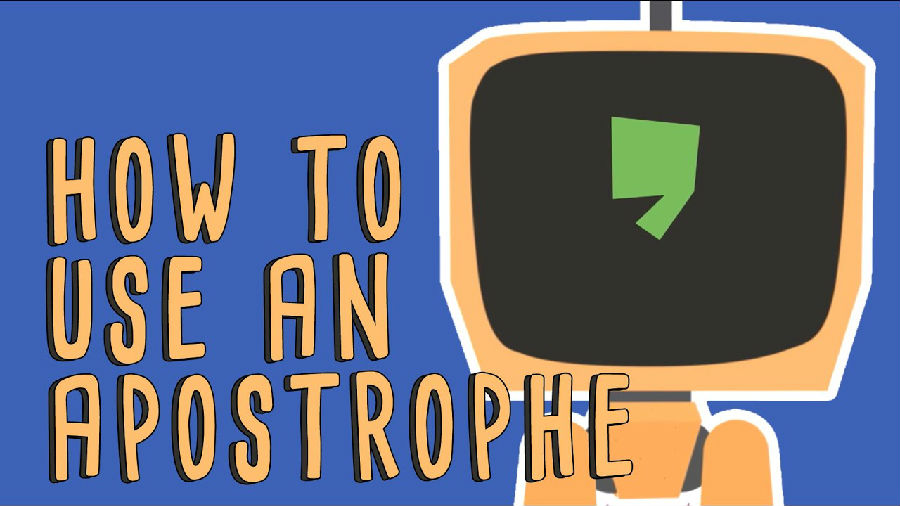(单词翻译:单击)
Is it a flying comma, or a quotation mark chopped in half?
这是一个“飞在半空中”的逗号,还是半个引号?
Either way, you may already be well-versed in how to use the apostrophe, but here's a quick refresher on its usage.
不论哪一种,你都可能已经精通撇号的用法,但这里有一个快速的关于其用法的复习课程。
The apostrophe can be used in three ways:
撇号有三种用法:
to mark possession, to mark contraction, to mark the plural of single letters.
表示个人所有物,表示缩略词,表示单一字母的复数形式。
Most of the time, if you see an apostrophe hovering helpfully near a word,
很多时候,如果你看见一个撇号在某个单词的旁边,
it's trying to mark possession or contraction.
这个撇号表示个人所有物或表示缩略词。
First, let's look at how the apostrophe marks possession.
首先,让我们来看一下撇号怎样表示个人所有物。
As you can see, the placement of this punctuation mark can really change the meaning of a sentence.
正如你所看到的,这个标点符号所在的位置可以改变整个句子的意思。
"Those robots in the sand are my sister's."
“那些在沙子里的机器人属于我的姐姐。”
"Those robots in the sand are my sisters.'"
“那些在沙子里的机器人属于我的姐姐们”
"Those robots in the sand are my sisters."
“那些在沙子里的机器人是我的姐姐们。”
When showing possession, the apostrophe belongs next to the noun that owns or possesses something.
当表示所有物时,撇号在表示所有者的名词的旁边。
The noun can be singular or plural. Proper nouns work, too.
名词可以是单数,也可以是复数。也可以是专有名词。
So if Lucy needs to get her robots under control before they cause mayhem,
因此,如果露西想在她的机器人们造成大混乱前将他们控制住,
those dangerous creatures would be "Lucy's robots."
这些“危险的生物”就是“露西的机器人”。
But what if Lucy was Lucas?
那么如果露西叫卢卡斯呢?
Would we write "Lucas' robots" or "Lucas's robots"?
我们应该写Lucas' robots还是Lucas's robots?
And what if Lucas gave his robots to the Robinsons family?
以及,如果露西将她的机器人们送给了罗宾逊一家呢?

Would it be "The Robinsons' robots," or "The Robinsons's robots"?
我们应该写The Robinsons' robots还是The Robinsons's robots?
The truth is, even grammar nerds disagree on the right thing to do.
事实是,哪怕语法狂们对此都有所争议。
The use of 's after a proper noun ending in s is a style issue, not a hard and fast grammar rule.
撇号加“s”在一个以s结尾的专有名词后的用法和个人写作风格有关,并不是一个很严格的语法规则。
It's a conundrum without a simple answer.
这是一个很难回答的问题。
Professional writers solve this problem by learning what's considered correct for a publication, and doing that.
专业作家们通过学习某一出版物的标准来解决这个问题。
The important thing is to pick one style and stick with it throughout a piece of writing. One more wrinkle.
重要的是选择一种格式,并在整篇作品中保持这一种格式。还有一个小问题。
Certain pronouns already have possession built in and don't need an apostrophe.
一些代词已经有了“所有物”的意思,因此不需要撇号。
Remembering that will help you avoid one of the trickiest snags in English grammar: its vs. it's.
记住这一点,可以帮助你解决一个英语语法中最棘手的问题:its和it's的区别。
"It's" only take an apostrophe when it's a contraction for "it is" or "it has."
It's是一个缩略词,表示“它是”或“它有”。
If you can replace "it's" with one of those two phrases, use the apostrophe.
如果你想表达这两种意思,你可以使用撇号。
If you're showing possession, leave it out.
如果你想表示所有物,不要用撇号。
Otherwise, contractions are pretty straightforward.
其他情况下,撇号相当简单易懂。
The apostrophe stands in for missing letters, and lets common phrases squash into a single word.
撇号可以代替省略的单词,使一个词组缩略成一个单词。
In rare cases, you can have a double contraction,
在一些少见的情况中,你可以有两个缩略处(使用两个撇号),
though those generally aren't accepted in writing, with the exception of dialogue.
这种写法通常不能出现在正式的写作中,除了表示对话。
So it's possessive, it's often followed by s's, and it's sometimes tricky when it comes to its usage. It's the apostrophe.
因此,表示所有格,通常后面会有一个“s”,用法有时候比较难。这便是撇号。


